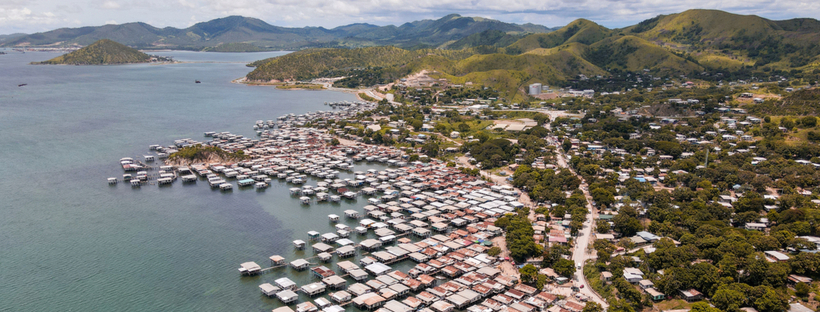A group of influential civil society organisations has called on the Export-Import Bank of the United States (U.S Exim) to reject an application to support a liquefied natural gas (LNG) project in Papua New Guinea.
The Papua LNG project risks leaving “US$13bn in stranded assets without securing guaranteed sales”, according to Oil Change International, at a time when the Pacific island faces significant climate threats.
In an August 29 letter to U.S Exim president and chair Reta Jo Lewis, 27 groups, including Friends of the Earth U.S, Australia’s Market Forces and the Papua New Guinea-based Centre for Environmental Law and Community Rights (Celcor), highlight the “significant financial risks and opportunity costs, as well as harmful climate impacts” of the project.
The Papua LNG project is operated by TotalEnergies, with major oil and gas companies ExxonMobil and Santos both co-venturers. Papua New Guinea’s national oil and gas company, Kumul Petroleum, is also a partner.
In 2021, Jean-Marc Noiray, TotalEnergies’ managing director for Papua New Guinea, said the company aimed to secure a final investment decision by Q4 2023, with production slated to begin at the end of 2027.
Classified by U.S Exim as a category A transaction, the project requires an environmental and social impact assessment that must be made public for at least 30 days before the export credit agency (ECA) can consider making a final decision.
“Climate science has advanced greatly in the last 10 to 15 years, yet Exim is failing to keep up. It should reject another handout to ExxonMobil and instead invest in renewables that will help the people of Papua New Guinea transition to a clean energy future,” says Kate DeAngelis, senior international finance programme manager for Friends of the Earth U.S.
Analysis by the Institute for Energy Economics and Financial Analysis (IEEFA), an international think tank, estimates the project’s total scope three emissions to be 220 million tonnes of CO2 equivalent, equivalent to the total annual emissions of the whole of Bangladesh.
“None of the project partners have any ambition to reduce their scope three emissions, raising concerns with investors who are starting to ask for more action to align with the Paris Climate Agreement objectives,” IEEFA says.
“The people of Papua New Guinea are already facing the full force of climate change,” says Peter Bosip, executive director for Celcor.
“Rising sea levels, extreme weather events, and environmental degradation are already threatening many people’s existence and threatening our way of life. Papua LNG will add to and exacerbate this climate crisis – and financiers cannot, and should not, finance it,” Bosip says.
The letter claims that Papua New Guinea “does not need fossil gas for its own energy needs” and has the potential to cover “78 percent of its on-grid energy needs from renewable energy by 2030 were appropriate financing made available”.
Gas was first discovered in this part of the country’s Gulf Province in 2006, in a jungle-covered area south of the Bismarck mountain range.
According to TotalEnergies’ website, the Papua LNG project “is committed to collaborating with the Papua New Guinea communities and government officials to safely develop these resources in a manner that protects the environment, encourage additional foreign investment, and contributes to the long-term social and economic stability of the country”.
Despite committing to ending new, direct public support for international fossil fuel projects in the Glasgow Statement, agreed at Cop26 in 2021, the U.S has yet to do so.
“Supporting new fossil fuel infrastructure investments through public finance institutions such as ECAs is not compatible with the letter and the spirit of the Paris Agreement,” says Igor Shishlov, head of climate finance at Perspectives, a German climate policy think tank that previously alleged US Exim was “unaligned” with the Paris Agreement.
According to the International Energy Agency and the Intergovernmental Panel on Climate Change, new oil or gas projects of any kind are not compatible with keeping below 1.5°C of warming.
In a statement provided to GTR, Shishlov says: “By approving support to the LNG project in Papua New Guinea, Exim is breaking the US’ commitment to end public support to international fossil fuels under the Glasgow Statement”.
U.S Exim has also failed to publish plans for ending its support of the sector, despite agreeing to do so before the end of last year.
And while the final investment decision for the Papua LNG transaction is pending, US Exim has already provided substantial financing for fossil fuel projects this year.
Oil Change International calculates that U.S Exim and US Development Finance Corporation have together approved US$1.5bn for four projects so far in 2023, making the U.S the biggest provider of fossil fuel finance out of the countries that signed up to the Glasgow Statement.
The two projects approved by U.S Exim are a US$99.7mn expansion of an Indonesian oil refinery and coverage for US$400mn in revolving credit facilities that enable Trafigura to buy LNG.
Discussing the Indonesian refinery, a senior U.S Exim official told GTR at the time that the ECA was “prevented from discriminating against deals solely on the basis of industry, sector or business”, a policy that includes the fossil fuel industry.
U.S Exim had not provided a comment in response to GTR’s request.
TotalEnergies, ExxonMobil, Santos and Kumul Petroleum did not immediately respond to requests for comment.
SOURCE: GLOBAL TRADE REVIEW/PACNEWS














